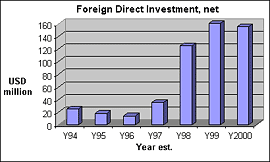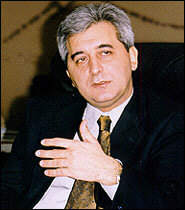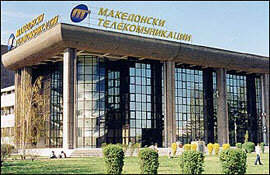 FOREIGN INVESTMENTS IN THE REPUBLIC OF MACEDONIA FOREIGN INVESTMENTS IN THE REPUBLIC OF MACEDONIA |
Foreign investments to the country are substantially increasing, and renowned foreign companies have already acquire ownership through privatization.
The advantages for attracting foreign direct investments are:
- maintenance of a stable political and economic climate;
- a legal framework established in conformity to the rules of market economy and democracy;
- a relatively solid basic infrastructure, into which investments continue to be made;
- adequately educated and relatively cheap manpower;
- a developed entrepreneurial spirit;
- a diversified product ional basis;
- expansion of the market through the concluded Free Trade Agreements;
- a strategic location as a natural point of access to larger markets.

The more distinguished foreign companies and banks that have invested in the process of privatization are the following:
- EBRD (The European Bank for Reconstruction and Development) from London, in Komercijalna Banka s.c. - Skopje;
- SOL SPA from Italy, in "Technogas" - Skopje;
- KNAUF GmbH from Austria, in "Knauf-Radika" - Debar;
- Wesfra Trade Export Import GmbH from Germany, in "Makedonija Sport" - Skopje;
- Energy Group AG from the Marshall Islands, in "Maktrans" - Skopje;
- East West Trade from Austria, in "Centro" - Skopje;
- Balkan Steel from Liechtenstein, in the "Cold Rolling Mill " - Skopje;
- Maripel S.A. from Italy, in "Bargala" - Shtip
- Socotab Leaf Tobacco Company from the USA, in "Jugotututn" - Bitola;
- Intabex Nederlands B.V. from the Netherlands, in "Jugotututn - Mara Dimova" - Kavadarci;
- Energointernacional 42 - a mixed Macedonian-Turkish company, in "Zletovo Batteries" - Probishtip.
Specific opportunities exist for investment via privatization. The Privatization Agency has a portfolio of residual shares, which are offered through the Macedonian Stock Exchange.
The privatization program in Macedonia is nearing completion. In the past decade, more than 1,616 companies were privatized and about 126 companies are left to be privatized via public tenders.
The Privatization Agency of the Republic of Macedonia is the key institution responsible for administrating and supporting of the privatization process. The mission of the Agency is associated with the final goal of the ownership transformation in Macedonia: to improve the efficiency of the country's economy, by establishing well-managed companies, which can successfully compete in the international markets.
Macedonia is making significant efforts to attract foreign investors. As illustrated by the forthcoming Investment Forum, to be held in June.
Regarding this forum, Macedonian Minister of Finance Nikola Gruevski says that it is meant especially for the investors who do not know much about the country. "They should come and see for themselves, " he says.

When Macedonia gained independence 10 years ago it inherited several so-called "futureless" enterprises, which used to be a cornerstone in the socialist regime of former Yugoslavia. However, with the support of potential foreign investors, these giants, which used to employ thousand of workers, might have a bright future.
"These enterprises were to supply the size of a market such as the former Yugoslavian one, and since Macedonia became independent, many factories have closed. Nowadays the factories are beginning to re-open but not at full capacity. Of course, the equipment is maybe old, but I still think that those capacities are attractive to some investors," Mayor of Skopje, Risto Penov says.
| 
One of the key elements of Macedonia's trade liberalization aimed at attracting more foreign investors are the so-called free trade agreements. In regard to this issue, President of the Economic Chamber Mr. Dusan Petrevski says: "The policy of the Government of the Republic of Macedonia is to spur the liberal relations in the foreign trade exchange with many states in the region and abroad. We signed free trade agreements with Slovenia, Croatia, Bulgaria, Yugoslavia, Turkey and Ukraine, and we are negotiating with Albania, Romania and Bosnia & Herzegovina. Free trade Agreement between EFTA and the Republic of Macedonia was signed in June 2000 and will be put into effect in 2001. We have interest to become members of CEFTA. Our ultimate objective is the membership in the European Union. This year we will sign the Stabilization and Association Agreement with the EU. It should be a sign for foreign investors that the Republic of Macedonia is not any more a market of two million consumers, but much bigger from that we had before."
The leading foreign investor is Greece, followed by Liechtenstein and Cyprus. More than 90% of the FDI attracted are in the manufacturing sector (ferrous metallurgy, cement production, crude oil processing, food and beverages, textiles, etc.). Since the end of 1997, the investment activity has been intensified, and in the year 2000 significant FDI have been attracted in the insurance and banking sectors.
The two biggest Greek investments in Macedonia are the Stopanska Banka, and the OKTA refinery.
Stopanska Banka is 70% owned by Greek National Bank, and 22% by the European Bank for Reconstruction and Development, and the International Finance Corporation.
Regarding the privatization of Stopanska Banka, and the interest of Greek investors to break into the Macedonian market, its manager Mr. Gligor Bishev says: "Macedonia is in the heart of the Balkans. For six or seven years in a row we have had macroeconomic stability, exchange rate stability, which is a solid background for potential investors. The National Bank of Greece has a strategy to expand and to become a leading bank in the region; they want to have more efficiency in Macedonian banking and to contribute to the country's economic stability."
Hellenic Petroleum privatized the Macedonian oil refinery OKTA in 1999. Ever since then, the refinery has maintained stable work, even besides the great turbulences on the world oil market.

Still the biggest foreign investment in Macedonia was the sale of the "Golden Hen" - the Macedonian Telecom, bought by Hungarian MATAV at the beginning of 2001 for about Euro 350 million. These fresh funds opened a line of opportunities for the country. As Minister of Transports and Communications Ljupco Balkoski reported, one third of the money gained from the "deal of the century" will be meant for new investments, for paying off debts and for investment protection. The General Manager of Makedonski Telekomunikacii Daniel Doncev, emphasizing the importance of this transaction says: "First of all, Macedonia has certainly the best - developed telecommunications infrastructure in the region. We are technologically the best-developed company. We are very profitable, in fact, the most profitable company in Macedonia with over 100 million DM per year as achieved in '99 and we followed thet trend in 2000." Referring to the question whether the optimal price was reached for the transaction, Doncev said: "If you analyze the profitability of the company, the market, the GDP, I certainly think we got a very fair price and it was certainly a very opened and transparent tender process, where in the end both OTE (the second bidder) and MATAV bided for 51%. But, finally, MATAV came out because on top of the cash buster there is also the commitment to invest Euro 250 million in capital investment over the next few years".

Regarding the future projects? Macedonia is currently the land of opportunities in the Balkans. Any foreign potential investor, businessmen or simply an observer can conclude this at a first glance. Sure, the country has certain problems, but it cannot be referred to as a "growing child" any more. "Macedonia is one of the rare countries on the Balkans with economic certainty," General Director of Alexandar Palace Hotel in Skopje Branko Azeski said. Macedonia did grow-up, and it grew-up in a democratically strong, financially very potential and very, very pro-European country. Corridor 8, Corridor 10, Stability Pact, free-trade agreements, Association and Stabilization Agreement with the EU only prove this. And, needless to say, there is a maximum consensus by all political parties in Macedonia that the only way to the future for the country is the one of an open market economy. |

